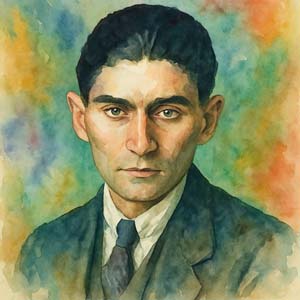— Franz Kafka
 Austrian writer Franz Kafka (1883–1924) was born on this day in Prague, Bohemia, to a Jewish middle-class family. Quiet and introspective, Kafka was inspired by Spinoza, Darwin, and Nietzsche. He wrote obsessively—then destroyed much of his early work.
Austrian writer Franz Kafka (1883–1924) was born on this day in Prague, Bohemia, to a Jewish middle-class family. Quiet and introspective, Kafka was inspired by Spinoza, Darwin, and Nietzsche. He wrote obsessively—then destroyed much of his early work.
“From a certain point onward, there is no longer any turning back,” he wrote. Kafka shifted between shades of tragedy and romance, crafting symbolism as haunting as it was precise.
“The meaning of life is that it stops,” he believed. His stories merged reality with dream, structure with absurdity.
In his most enduring work, The Metamorphosis (1915), a man wakes to find himself transformed into a giant insect. That surreal, claustrophobic vision gave rise to the adjective “Kafkaesque.”
“My fear … is my substance, and probably the best part of me,” he confessed.
Few of his works were published while he lived. Dying of tuberculosis, Kafka asked his friend Max Brod to burn his manuscripts. Brod refused—and gave the world a literary gift of enduring light.
“Anyone who keeps the ability to see beauty is never old,” Kafka wrote. Alongside George Orwell, he exposed the alienation of the 20th century with startling precision.
Poet W.H. Auden praised him as “the author who comes nearest to bearing the same kind of relation to our age as Dante, Shakespeare, and Goethe bore to theirs.”
Kafka was a quiet soul...curious, searching, full of feeling. He saw what others missed. In the spaces between fear and wonder, he found truth. Let us honor his truth and the way he turned the invisible into art.
More Kafka Quotations
 Change your perspective, change your life.
Change your perspective, change your life.
